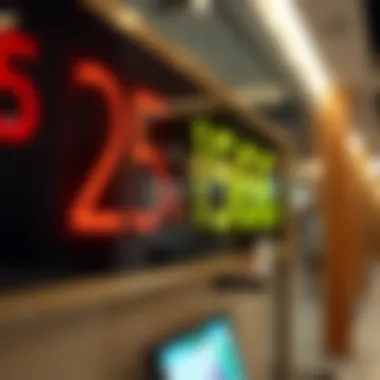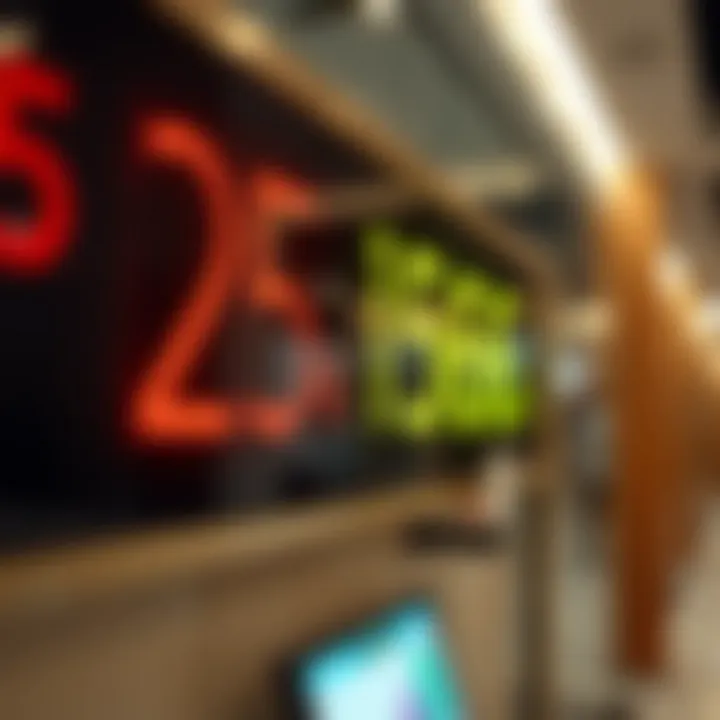Converting Dollars to Dirhams: Currency Exchange Insights


Intro
In a world that is ever more interconnected, understanding currency conversion is vital for anyone looking to invest or navigate the global marketplace. One key conversion that attracts considerable attention is that of dollars to dirhams, particularly in the context of Dubai's booming real estate market. This isn't just about simple math; it's about grasping the economic undercurrents that influence both everyday transactions and hefty investments.
As global players flock to Dubai for its tax-friendly environment and luxurious lifestyle, the significance of currency exchange takes center stage. Investors, homebuyers, and realtors alike must navigate the waters of the dollar to dirham conversion with a strategy in mind. With the backdrop of historical trends and current market dynamics, investors can make more informed decisions about their ventures in this vibrant city.
In the sections that follow, we'll delve deeply into the mechanics of currency conversion, explore market trends and insights, and how these factors play into the broader narrative of property investments in Dubai. By equipping ourselves with this knowledge, we can better navigate the melting pot of opportunities and challenges that the market presents.
Understanding Currency Exchange Basics
Currency exchange is the cornerstone of international trade and finance. For investors, realtors, and homebuyers looking to participate in the Dubai market, grasping these basics is crucial. In an interconnected world, knowing how to navigate different currencies can save significant amounts of money and open doors to opportunities.
Definition of Currency Exchange
Simply put, currency exchange refers to the process of converting one currency into another. This process happens in various contexts, including travel, trade, and investment. For example, if you're planning a trip to Dubai, you'll need to exchange your dollars for dirhams to cover expenses, from dining out to shopping at local bazaars.
The act of currency exchange isn’t just a mundane task; it involves several factors like supply and demand, geopolitical events, and economic policies. For a clearer picture, consider how a tourist exchanges U.S. dollars for United Arab Emirates dirhams at a local bank or exchange bureau. In this instance, the exchange rate can fluctuate daily, influenced by market conditions and economic reports.
How Exchange Rates are Determined
Understanding prevailing exchange rates takes us deeper into the mechanics of currency exchange. Rates are predominantly influenced by a plethora of factors:
- Market Supply and Demand: If there is high demand for dirhams, the exchange rate may rise, making dollars less valuable in comparison.
- Inflation Rates: A country with lower inflation rates generally sees an appreciation in its currency value. Conversely, high inflation can diminish a currency's purchasing power.
- Interest Rates: Central banks influence currency value through interest rates. Higher interest rates offer lenders a better return relative to other countries, attracting foreign capital and raising the currency's value.
- Political Stability and Economic Performance: Countries perceived as stable and with strong economic performances attract foreign investors, boosting demand for their currency.
"The currency market is a delicate balance, where every decision can reverberate through the financial world."
In summary, grasping the intricacies involved in currency exchange sheds light on why and how your dollars convert into dirhams. As we progress through this article, understanding these concepts equips readers with the knowledge necessary to make informed decisions in the Dubai real estate market.
The Dollar to Dirham Exchange Rate
The exchange rate from U.S. dollars to dirhams is not just a number; it serves as a crucial indicator for both seasoned investors and those new to the market. Understanding this exchange rate can illuminate various factors about economic health, foreign investments, and perhaps even the best time to make a purchase or investment. Its importance extends beyond mere currency conversion; it influences decisions involving real estate, trade, and tourism within Dubai.
Recognizing shifts in this exchange rate can benefit individuals and businesses alike. Investors keeping a keen eye on these fluctuations can seize opportunities that others may overlook. It also helps in planning budgets for property transactions, as a sudden dip in the dollar's value against the dirham can significantly affect purchasing power.
Current Exchange Rate Overview
As of now, the exchange rate has shown to be relatively stable but subject to global economic forces. It's vital for potential buyers and investors to stay updated, as today's figures can shift in the blink of an eye depending on international situations. At the moment, one U.S. dollar is approximately equivalent to 3.67 dirhams.
Fluctuations in this exchange rate may occur due to various reasons, including changes in oil prices, political instability, or shifts in interest rates. A glance at the currency markets reveals that these rates can be constantly in motion, often swayed by factors both local and international.
Fluctuations Over Time
The dollar to dirham exchange rate has seen variations historically, influenced by multiple economic cycles. For many, keeping track of these trends is like watching the tides come and go; it reflects broader economic shifts more than just mere numbers.
- Historical Patterns: In previous years, the exchange rate was more volatile, reflecting the uncertainties in the global market. This volatility can serve as a lesson in patience for investors.
- Key Economic Events: Major financial crises, local economic policies, or even global incidents can cause significant shifts. For instance, during the COVID-19 pandemic, many currencies saw unpredictable oscillations.
- Long-Term Trends: Although short-term fluctuations can be alarming, the long-term view often presents a different story. A historical analysis can reveal whether the dirham is gaining strength against the dollar or vice versa.
Understanding these fluctuations is valuable for optimizing investments. Keeping an eye on the patterns might require some effort, but it's akin to reading a map before embarking on a journey; it provides direction and insight.
"Monitoring currency fluctuations equips investors with knowledge that can transform financial decisions from guesswork to informed strategies."
By exploring the dollar to dirham exchange rate in-depth, individuals can better prepare themselves for their financial adventures in Dubai’s mash of luxury and opportunity.
Calculating Thirty-Six Dollars in Dirhams
Calculating thirty-six dollars into dirhams is more than just a simple mathematical operation; it's an essential part of understanding the economic landscape when dealing with currency exchange in a global marketplace like Dubai. Knowing how to convert currency correctly can heavily influence investment decisions, particularly in the thriving real estate sector of the UAE. This section reveals the straightforward methodology for currency conversion while pondering key elements, benefits, and considerations that might come into play.
Simple Conversion Process
The process of converting thirty-six dollars into dirhams can be summed up in a few steps. First, it's important to know the current exchange rate. This could fluctuate, so checking reliable sources is crucial. Websites like X-Rates offer up-to-date rates, or you could use financial news portals as well to confirm.
- Find the Current Exchange Rate: As an example, if the exchange rate is around 3.67 dirhams for 1 dollar, the calculation becomes simple.
- Multiply the Amount in Dollars by the Exchange Rate:
$$ 36 ext USD imes 3.67 ext AED/USD = 132.12 ext AED $$
Here, thirty-six dollars are equal to about one hundred thirty-two dirhams. - Consider Transaction Fees: When converting currency, it's wise to note that financial institutions may charge transaction fees. This could affect how much dirhams one will finally receive.


Overall, this conversion process is quite elementary, yet it sheds light on the need for accuracy in currency exchange.
Factors Influencing Conversion Amounts
Several factors can play into the final amount you end up with when converting dollars to dirhams. Below are a few key considerations to keep in mind:
- Market Movements: Currency markets are volatile. Significant global events can swing exchange rates dramatically.
- Economic Indicators: Factors such as inflation rates, employment data, and GDP growth in either the U.S. or the UAE can signal shifts in exchange rates.
- Supply and Demand: As more individuals seek to convert dollars to dirhams for investment or travel, it can drive demand and alter the rates.
- Regulatory Policies: Economic or monetary policies implemented by central banks can also impact the currency values.
Understanding these factors is crucial for anyone looking to invest in Dubai’s property market. A well-informed investor makes better decisions.
With this knowledge, one can approach currency exchange not just with a calculator, but with a strategic mindset.
Significance of Currency Exchange in Dubai Real Estate
Understanding the importance of currency exchange in Dubai’s real estate market offers insights into how economic factors influence investments. The world tends to view Dubai through a prism of extravagance and innovation, where glistening skyscrapers dot the skyline and luxury homes beckon foreign buyers. In this context, currency conversion isn't merely a financial procedure; it's a vital cog in the machinery of property transactions, impacting everything from buying decisions to market dynamics.
Impact on Foreign Investments
The real estate sector in Dubai thrives on foreign investments, with a substantial number of buyers hailing from Europe, Asia, and the Americas. For investors looking to dip their toes in, understanding the nuances of currency exchange can spell the difference between profit and loss.
Here’s what to keep in mind regarding foreign investments:
- Exchange Rates Influence Investment Costs: The initial investment amount in dirhams can shift significantly based on the current dollar to dirham exchange rate. A favorable exchange rate may entice foreign investors, while an unfavorable rate could slow down transactions.
- Risk Management: Investors need to consider the fluctuations in exchange rates during their property purchase. Utilizing tools such as hedge contracts can mitigate the risks involved. By locking in today’s exchange rate for tomorrow’s payment, foreign investors can safeguard their financial commitments.
- Market Sentiment: The prevailing rates also affect overall market sentiment. If the dollar strengthens against the dirham, potential buyers may perceive Dubai properties as more expensive and thus may hesitate. Conversely, a weaker dollar can stimulate a buying frenzy as investments appear more affordable.
In essence, foreign investments in Dubai's real estate ecosystem hinge upon a complex dance between different currencies, where timing and strategy can either unlock doors or close them.
Role in Property Valuation
Currency exchange plays a significant role in property valuation, directly affecting appraisals and market analyses. Valuations provide a snapshot of how properties are perceived against the financial backdrop of the investors’ home currency.
- Localized Pricing: Properties might be priced in dirhams, but foreign investors often calculate values based on their domestic currency. This brings into focus the need for a comprehensive understanding of exchange rates to determine fair value.
- Impact on Comparative Analysis: When property analysts evaluate similar properties, the resulting prices in dirhams must reflect their equivalent value in dollars. Any disparities caused by sudden currency shifts can mislead potential buyers.
- Investment Feasibility: Depending on the currency exchange trends, some property investments might be deemed feasible, while others fall into the realm of unrealistic expectations. A nuanced understanding of market values tied to exchange rates allows for informed decision-making in property investments.
The interplay of currency exchange not only impacts individual transactions but also defines the broader landscape of property valuation in Dubai. Investors, therefore, must remain vigilant, adapting their strategies to account for these fluctuating economic variables.
"Being aware of the impact of currency exchange on property values means staying ahead in the competitive landscape of Dubai’s real estate market."
In summary, the significance of currency exchange in Dubai's realm is multifaceted. As a key determinant of investment potential and property valuation, understanding this dynamic is essential for buyers and investors alike.
Practical Applications for Buyers and Investors
Currency exchange is not just a number crunching exercise; it's a fundamental aspect for anyone diving into the world of investments or property buying. For foreign investors eyeing Dubai's lucrative real estate market, understanding practical applications for converting dollars to dirhams can greatly influence their financial outcomes. When it comes to this dynamic city, a solid grip on exchange rates can mean the difference between sealing a good deal or missing out altogether.
Strategizing Currency Exchange for Purchases
When planning a purchase in dirhams, savvy investors first set the stage by strategizing their currency exchanges. This is not merely about looking up the current exchange rate on any finance app; it involves a thoughtful assessment of market trends and timing. Investors need to consider:
- Exchange Rate Trends: Monitoring fluctuations over time helps in identifying favorable conditions. A bad day at the market can turn good money into a rather unappealing amount of dirhams.
- Transaction Fees: Financial institutions often charge hidden fees for currency conversion. Understanding these costs upfront ensures the investor isn’t caught off guard when finalizing a transaction.
- Budgeting for Future Purchases: If an investor plans multiple transactions, it's key to budget currency exchanges over time. This can also include considering bulk exchanges when the rates are favorable, reducing overall transaction costs.
- Local Market Insights: Engaging with local real estate experts or currency brokers can offer valuable insights. They bring knowledge about past patterns and potential future shifts, which an average investor might overlook.
In sum, getting the strategy right for currency exchange can smooth the path to successful investments and can prevent financial pitfalls in the fast-paced Dubai market.
Timing the Currency Market
The volatility of currency markets presents both risk and opportunity. Timing your currency exchanges can be crucial to maximizing your investment potential. Here are key points to consider:
- Watch for Economic Indicators: Economic reports, announcements by central banks, and geopolitical events can sway exchange rates dramatically. Keeping an eye on these real-time developments can provide cues on the best moments to exchange.
- Use Historical Data: Study the historical performance of the dollar against the dirham. While past performance is not a guaranteed predictor of future outcomes, understanding trends can aid in making an informed decision.
- Set Alerts: Utilize online currency converter tools that alert you when rates hit your target. Such tools can minimize the effort involved and ensure you don’t miss a favorable rate.
- Be Cautious with Predictions: Blindly following market predictions could lead to losses. The currency market can be unpredictable. A seasoned investor knows to weigh expert advice against their own research before making a move.
In this fast-paced environment, timing your currency exchanges means staying alert and being ready to act. An investor who can anticipate the right moment is better positioned to achieve a favorable conversion of dollars into dirhams, ultimately making a sound investment in the bustling market of Dubai.
Historical Trends in Currency Exchange Rates
Understanding historical trends in currency exchange rates is crucial for grasping how currencies fluctuate over time. It provides a backdrop against which current and future changes can be assessed, especially for investors and buyers delving into the Dubai real estate market. Variations in exchange rates often relay signals about economic health, international stability, and market confidence. Knowing how the dirham has performed in the past can help investors make keen judgments about their financial ventures. It equips them for strategic decision-making in an inherently unpredictable realm.
Past Performance of the Dirham


The dirham, the official currency of the United Arab Emirates, has had a unique trajectory since its introduction in 1973. Initially pegged to the US dollar, this currency has seen its share of ups and downs, reflecting broader economic conditions—both locally and globally. Over the past decades, the dirham has often maintained stability against the dollar, which is generally an asset for international investors.
- Limited volatility: The peg to the dollar results in low volatility compared to floating currencies. It bolsters investor confidence because the dirham's value remains predictable. Investors tend to favor environments where currency values are stable, particularly in real estate transactions.
- Economic growth signals: Strong performance indicators like non-oil GDP growth in the UAE have provided a positive backdrop for dirham stability, reinforcing the notion that local economies can sustain their currency value.
However, while historical performance tends to lean towards stability, there are noteworthy moments that shift the landscape. For instance, regional conflicts or oil price fluctuations can cause immediate impacts that ripple through to the currency.
Economic Events Shaping Exchange Rates
Economic events play a pivotal role in shaping the exchange rates, and this is particularly true for the dirham. Several occurrences have marked the path of currency valuation.
- Oil Price Fluctuations: Being an oil-rich nation, the UAE's economy is significantly influenced by global oil prices. Rising prices can lead to economic booms, thus strengthening the dirham, while downturns can lead to depreciation and, consequently, affect foreign investments directly.
- Global Economic Crises: Events like the 2008 financial crisis profoundly affected currencies worldwide. The dirham's stability offered a safe haven for investors during a turbulent time, resulting in increased foreign interest in real estate.
- Policy Changes: Central bank policies, particularly those concerning interest rates, can sway currency performance dramatically. A rate hike might attract foreign investors looking to capitalize on higher returns, which can enhance the currency's value.
Each of these elements contributes to the currents of exchange rates, fabricating an intricate tapestry that influences decisions for buyers and investors alike.
"The past performance of a currency can shed light on its future, offering investors a tool for navigating today's volatile markets."
By examining the dirham's historical trends alongside economic events, stakeholders can glean significant insights that support their investment choices in Dubai's real estate market.
Common Myths About Currency Conversion
In the realm of currency exchange, particularly when it comes to converting dollars to dirhams, a significant number of misconceptions can cloud judgment and decision-making. These myths not only stem from misunderstandings but can lead to misguided choices, especially for investors and individuals looking to navigate the financial waters of Dubai's economy. It's crucial to peel back the layers on these notions as understanding the true essence of currency exchange can foster smarter investing and buying strategies.
Debunking Misconceptions
When looking at the common beliefs surrounding currency conversion, several myths pop up that need some serious scrutiny. One prevalent myth is that conversion fees are not that significant. Many assume that a small fee won’t affect their overall financial outcomes. However, the reality is that even slight fees can accumulate, especially with larger transactions. When converting a substantial amount, like purchasing property, every dirham counts. It’s essential to remain vigilant and fully understand any fees involved in the conversion process.
Another widespread misconception is that exchange rates are static. People often think that once a rate is set, it sticks. But that’s not the case; it’s like a rollercoaster—up one day, down the next. The rates fluctuate due to various factors including economic reports, market speculation, and geopolitical events. Hence, waiting for the perfect moment to convert might be impractical; staying informed and being proactive is key.
Furthermore, many believe that the best rates are always found at banks. This isn’t necessarily true as exchange houses or online services sometimes offer more competitive rates. It’s always wise to shop around and compare rates to ensure that you’re getting the best deal possible.
Understanding Exchange Market Realities
The truth in the currency exchange market is often stranger than fiction. One reality is that speculating on currency movement is a high-risk venture. Many individuals fall into the trap of predicting exchange rate movements, thinking they can outsmart the market. However, this is often akin to trying to catch smoke with your bare hands—slippery and elusive. Successful exchange strategies require research, but they should also be built on solid, informed foundations rather than mere hunches.
The notion that exchange rates solely depend on the economy of the states involved is another piece of the puzzle often overlooked. While the economic state of the dollar and dirham has weight, global incidents, trade tensions, and even shifts in oil prices can drastically shape how these currencies interact, which isn’t always visible at first glance.
Summary
Clearing up these myths is not just for safeguarding investments but also for cultivating a sound strategy when engaging with the currency exchange market in Dubai. Armed with the right knowledge, individuals can navigate the complexities of converting dollars to dirhams with greater confidence, ensuring that they are not only making sound financial choices but also acknowledging the ever-changing landscape of currency trends. Understanding these common myths allows buyers and investors to make informed decisions and potentially avoid costly missteps.
Tools and Resources for Currency Conversion
When it comes to converting dollars to dirhams, having the right tools and resources at your disposal can save you both time and money. Currency conversion can be a tricky affair, especially for investors or individuals making significant transactions. This section aims to outline the critical elements that you need to be aware of, focusing specifically on the resources that can enhance your currency exchange experience.
The digital age has provided an array of options for those looking to understand and manage currency conversions. From online converters to mobile applications, each of these tools offers unique benefits and can be tailored to different needs. Below, we will delve deeper into two main categories of resources: Online Currency Converters and Mobile Applications for Currency Tracking.
Online Currency Converters
Online currency converters have revolutionized the way we perform foreign exchange calculations. These tools allow users to obtain real-time rates, making it much easier to see how many dirhams they will receive for their dollars. Here’s a closer look at their considerable advantages:
- Instant Results: Users can get immediate conversion results without the need for complex calculations.
- Updated Rates: Currency values fluctuate, and online converters often provide the most up-to-date rates directly sourced from financial markets, ensuring that you are working with accurate data.
- User-Friendly Interface: Most converters are designed to be intuitive. This means that even non-tech-savvy individuals can navigate them easily.
- Multiple Currencies: Many converters support a variety of currencies, allowing users to plan their international transactions.
Some popular online currency converters include XE.com, OANDA, and X-Rates. By leveraging these resources, you not only enhance your ability to make informed decisions but also mitigate the risk of losing money due to unfavorable exchange rates.
Mobile Applications for Currency Tracking
In an increasingly mobile-oriented world, tracking currency changes on the go is essential for real-time decision-making. Mobile applications designed for currency exchange provide numerous benefits:
- Convenience: Just like pulling out your phone to check a message, you can pull up your conversion rates anywhere—be it at a coffee shop or during travel.
- Alerts for Market Changes: Many of these apps allow users to set alerts for specific rates, letting you know when the market is ripe for conversion.
- Comprehensive Financial Tracking: Some applications go beyond mere conversions; they provide insights into your transactions and can help budget your money more effectively.
- Offline Capabilities: Certain apps can function even without an internet connection, making them reliable tools when traveling abroad.
Examples of noteworthy mobile applications include Currency Converter Plus and Easy Currency Converter. With these tools, monitoring and managing foreign exchange becomes not just easier but smarter.


Cultural Implications of Currency Exchange in Dubai
Currency exchange in Dubai is not just a financial transaction; it reflects the cultural melting pot of the city. This makes understanding the cultural implications vital for anyone involved in buying property or investing in the emirate. Dubai has transformed into an international hub, drawing people from various parts of the world, each bringing their own currency, customs, and economic norms.
As you navigate the cultural implications of currency exchange, you will notice its significant role in fostering economic relationships among different nationalities. Together with the emotional facet of these transactions, there is a need to comprehend local customs that might impact how business is conducted. Investors, whether seasoned or newcomers, should appreciate these aspects to better connect with local stakeholders and suppliers.
Navigating Multicultural Transactions
In a place as diverse as Dubai, understanding how to navigate multicultural transactions can make or break a deal. You may find that some expatriates have unique ways of conducting business based on their background. For instance, negotiation styles can vary broadly, where some cultures may prefer direct communication, while others rely more heavily on building personal rapport before diving into business details. This dynamic underscores the importance of being adaptable in your approach.
Language also plays a key role. Most transactions will be conducted in English, but fluency in Arabic—especially for real estate dealings—can foster goodwill. Simple phrases and gestures can signal respect for local culture and ease the exchange process.
Moreover, certain festivals and holidays may impact trading times and business operations. For example, during the month of Ramadan, transaction times might change, and local attitudes toward money can vary as people engage in charitable acts and family gatherings. Being aware of these factors can provide you with a strategic edge in negotiations.
Influence of Currency on Local Businesses
The dynamics of currency exchange is pivotal for local businesses in Dubai. As an international business hub, the foreign currency influx significantly impacts various sectors, particularly retail and real estate. When the value of the dirham remains stable against other currencies—like the American dollar—local businesses can plan their pricing strategies more effectively, ensuring that profit margins remain healthy.
On the flip side, fluctuations in currency values can lead to unpredictable effects on importing goods. For instance, if the dirham weakens against the dollar, import costs can skyrocket, affecting pricing and availability. Local businesses must keep a keen eye on the currency exchange forecasts to adjust their strategies accordingly.
Understanding these financial fluctuations is key. Small businesses might have to reevaluate their pricing models or develop hedging strategies to mitigate exposure to currency risk.
Such financial prudence can determine sustainability, especially for businesses relying heavily on imports. Investors must consider how these currency fluctuations affect the market as a whole, making it crucial to assess not just immediate transactions, but the overall economic framework.
In summary, engaging with the cultural implications of currency exchange in Dubai is essential for anyone looking to invest or buy property. It is more than just numbers on a screen; it encompasses understanding relationships, customs, and the dynamic nature of local businesses that contribute to the booming economy.
Future Trends in Currency Exchange
The realm of currency exchange isn’t static; it’s a living, breathing entity shaped by a multitude of factors. As investors, homebuyers, and financial analysts well know, being attuned to these shifts can mean the difference between a shrewd investment and a missed opportunity. This section delves into what lies ahead in the realm of currency conversion, particularly focusing on the dollar-to-dirham exchange rate.
Predictions for the Dollar and Dirham
As we look toward the future, it’s essential to consider a variety of elements that might influence the dollar and dirham exchange rates. Many economists forecast certain trends based on current economic indicators and historical performance.
- Global Economic Conditions: The relationship between countries' economies greatly impacts exchange rates. Factors like employment rates, inflation, and GDP growth can give clues about expected performance in currencies.
- U.S. Federal Reserve Actions: Decisions made by the Federal Reserve, including interest rate adjustments, can significantly sway the dollar’s strength, affecting its exchange rate against the dirham.
- Oil Prices: As the UAE's economy is heavily tied to oil, fluctuations in oil prices can influence the dirham's relative value. A surge in oil prices may bolster the dirham's strength. Conversely, a drop might weaken it.
- Geopolitical Factors: Events like political stability, trade negotiations, or tensions can introduce volatility. Keeping an eye on these developments can provide potential insights on how the currencies may react.
Understandably, these predictions aren't cast in stone, and the currency exchange landscape may be painted by unexpected details.
"Forewarned is forearmed"—holding on to this adage when navigating currency trends can be a handy compass for savvy investors.
Technological Innovations Shaping Exchange
Technology has been a game changer in many sectors, and currency exchange is no exception. A few technological advancements are paving the way for more efficient, user-friendly processes in currency exchange:
- Blockchain Technology: Recently, blockchain has begun to redefine how we think of currency. By providing a decentralized and secure way to track transactions, it could potentially lessen the risks associated with currency exchange.
- Mobile Wallets and Applications: Apps like Revolut and TransferWise have revolutionized how individuals convert currencies. They often offer better rates than traditional banks by leveraging technology to decrease overhead costs and maximize user benefits. Nowadays, it’s just a matter of clicking a button on your smartphone.
- AI and Machine Learning: These technologies help predict exchange rate movements by analyzing massive datasets that humans can’t sift through as efficiently. This means better forecasting and more informed decision-making for stakeholders.
With these innovative solutions, the future of currency exchange looks promising. Being aware of these elements not only empowers investors but also equips them with the tools necessary to make strategic financial decisions, particularly in fluid markets like the Dubai real estate scene.
Final Thoughts on Currency Exchange and Real Estate
Navigating the landscape of currency exchange, particularly between the dollar and dirham, has become an essential aspect of real estate investment in Dubai. Understanding this dynamic can influence not just the immediate purchasing power of investors but also shape the strategies they employ over the long run. With the increasing number of foreign investors seeking opportunities in the Dubai property market, its pivotal role in economic growth cannot be overstated.
As we summarize the key points presented throughout this article, let's emphasize the importance of staying updated on exchange rates. Currency fluctuations can have a substantial impact on investment potential, particularly for those coming from nations with weaker currencies. In Dubai’s booming property market, these variations can affect everything from property valuations to the affordability of maintenance and property management costs.
Investors also benefit when making informed decisions timely. Understanding the exchange rate before making a significant investment can lead to cost savings that might otherwise go overlooked. This underscores the necessity for real estate investors and homebuyers to engage with up-to-date financial tools and conversion services, allowing them to gauge the ideal moments to exchange their money, thus hedging against adverse market shifts.
"Successful real estate investment isn’t merely about property; it also encompasses an astute understanding of currency dynamics."
Financial literacy in regards to currency conversion, especially within the context of ongoing and anticipated economic events, is key. This article has illuminated the various aspects of converting dollars to dirhams and what that means within the wider context of Dubai’s real estate market.
Summary of Key Points
- Understanding Exchange Dynamics: Currency exchange rates fluctuate based on various economic indicators. Knowledge of these fluctuations enhances decision-making for investors.
- Real Estate Impact: Currency conversion plays a direct role in the valuation of properties in Dubai, affecting desirability to foreign buyers.
- Future Considerations: Staying informed on future trends and technological innovations can offer a competitive edge in property investments.
Encouraging Informed Decision Making
As we wrap up the discussion on the importance of currency exchange in real estate, it's essential to encourage investors to be vigilant and proactive. Regularly assessing conversion rates and monitoring market conditions is fundamental for maximizing investment potential. Educating oneself on the factors that impact both the dirham and dollar can empower buyers and investors to make choices that can lead to favorable outcomes.
In a world where exchange rates are in constant flux, leveraging technology like mobile applications and online tools for up-to-date news is no longer optional—it's a necessity. By actively engaging with market knowledge and employing strategic decision-making practices, investors can steer through the complexities of currency exchange with confidence.















